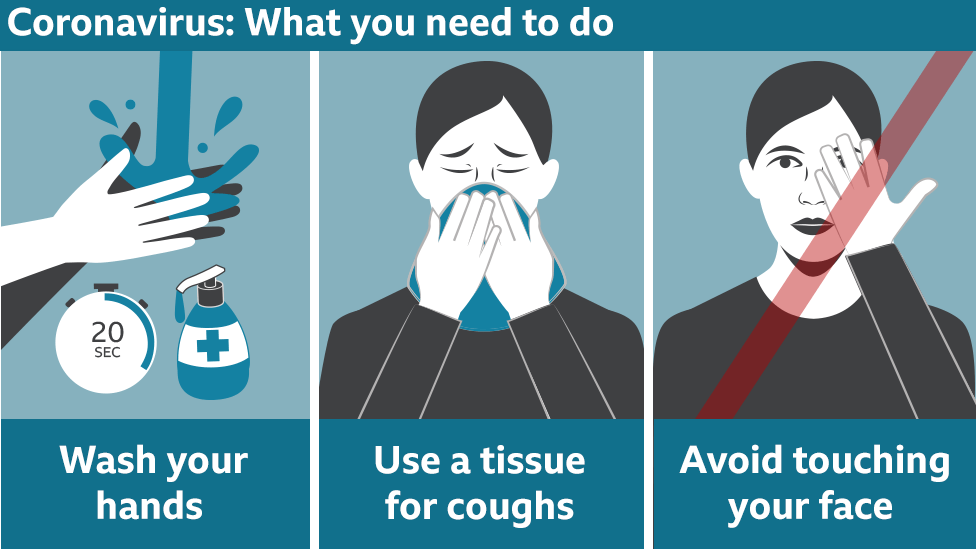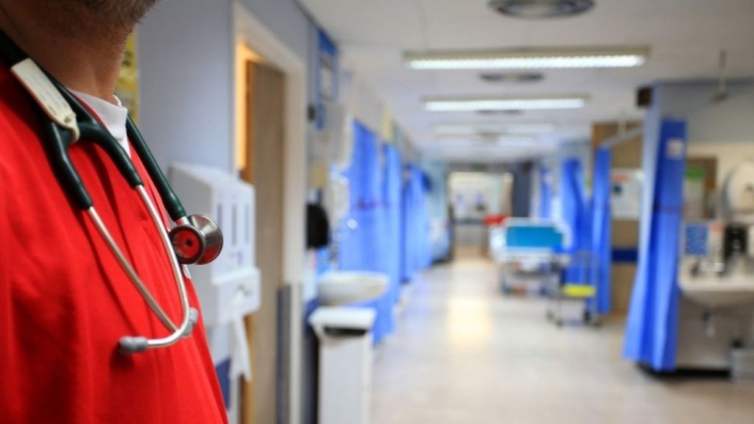Letters are being sent to more than 65,000 retired doctors and nurses in England and Wales asking them to return to the NHS to help tackle the coronavirus outbreak.
Senior officials say the ex-employees are needed to boost frontline services.
Meanwhile, the government has pledged to ensure that all hospitals have enough protective gear and ventilators.
It also published a list of key workers whose children will still be able to go to school after they shut later.
And the chancellor is set to announce a wage subsidy package to protect jobs.
Many firms are warning of collapse, wiping out thousands of jobs, as life in the UK is largely put on hold.
One proposal under discussion is for the UK to follow the lead of countries such as Denmark, where the government has promised to cover 75% of salaries at private companies for three months, if they promise not to let staff go.
In the UK, 144 people with the virus have died, and 3,269 people have tested positive for Covid-19.
Schools in the UK will close from Friday except for those looking after the children of key workers and vulnerable children.
Among those workers listed in government guidance as critical to the virus response are health workers, teaching staff, police and people working in the production and delivery of vital goods such as food and medical equipment.
Children with at least one parent working in the listed sectors can continue to attend school but the government is asking parents to keep their children at home wherever possible.
Who are "key workers"?
The full list includes:
- Frontline health workers such as doctors and nurses
- Some teachers and social workers
- Workers in key public services including those essential to the justice system, religious staff, and public service journalists
- Local and national government workers deemed crucial to delivering essential public services
- Workers involved in food production processing, distribution, sale and delivery
- Public safety workers including police, armed forces personnel, firefighters, and prison staff
- Essential air, water, road and rail transport workers
- Utilities, communication and financial services staff, including postal workers, and waste disposal workers
It comes as England's top nurse and top doctor urged medics who have left the NHS in the last three years to re-register with the regulatory bodies to help in the battle against the "greatest global health threat in history".
Final-year medical students and student nurses could also be given temporary work to boost the ranks.
Those who return will be assessed to see how they can best help the NHS fight the pandemic.
Ruth May, chief nursing officer for England, said: "I am urging all recent former nurses to lend us your expertise and experience during this pandemic, because I have no doubt that you can help to save lives."
Professor Stephen Powis, national medical director for the NHS, said returners "will make more of a difference than ever before - not just to patients, but to colleagues and the wider community".
The Nursing and Midwifery Council will write to 50,000 nurses whose registration has lapsed in the last three years; and the General Medical Council will contact another 15,500 doctors who have left since 2017.

It comes as Health Secretary Matt Hancock pledged to rush protective personal equipment (PPE) to frontline NHS staff and social care providers, following concern workers were being put at risk by shortages.
Speaking on BBC One's Question Time, Mr Hancock said the UK had shipped 2.6 million masks and 10,000 bottles of hand sanitiser in the last 24 hours.
He promised that "overnight 150 hospitals will get the next pack of protective equipment they need… every single hospital will get their next batch of equipment before Sunday night".
He also confirmed social care providers would get a package of personal protective equipment by the end of next week.
In response to a government appeal for more ventilator makers, 1,400 companies had offered to switch their operations to help manufacturer them, including Formula One, Mr Hancock said.
He added that officials would work with leading companies to radically increase the number of coronavirus tests, after the government pledged 25,000 tests per day within four weeks.
The government has bought a test that can detect whether someone has had coronavirus - and their immunity to it, he confirmed.
Mr Hancock also admitted he could not live on statutory sick pay of £94.25 per week, ahead of the chancellor's expected announcement of further measures to help workers and companies.
The health secretary's comments came during the first Question Time to be filmed without a studio audience as the BBC followed advice over social distancing.
In a message to the nation on Thursday, the Queen urged people to come together for the common good.
The 93-year-old praised the work of scientists, medics and emergency staff, but added that everyone has a "vitally important part to play".
The monarch's comments came shortly before the PM led the government's daily press conference, saying the UK can "turn the tide" on the coronavirus crisis within 12 weeks.
But pressed on what he meant by the three-month timescale, he said he did not know how long it would go on for.
Mr Johnson went on to rule out closing down public transport in London but pointed out people in some parts of the capital were not following government guidance on social distancing and would be "enforced" to do so if necessary.
In other key developments in the UK:
- Trials of a coronavirus vaccine could begin within the next month, Public Health England has said
- Military leaders have been told by the head of the armed forces to be ready by the middle of next month to help respond to the pandemic, in guidance seen by the BBC
- Ministers are asking phone operators if they can use mobile data to help monitor whether people are following social distancing advice
- Train operators across Britain will gradually reduce services from Monday
- Jaguar Land Rover, is to join Nissan and Vauxhall in suspending production at its UK plants
- The Bank of England has cut interest rates from 0.25% to 0.1% - the lowest level in its history.
- The Catholic Church in Britain will suspend public masses from Friday evening until further notice
In other key developments around the world:
- Italy's death toll rose by 427 to 3,405, overtaking China's toll
- Argentina has become the first country in South America to ban all citizens from leaving their homes except to buy food and medicines
- An estimated 400 British nationals are among those stranded in Peru, after the country closed its borders and flights were suspended
- California, the most populous US state, has issued a "stay at home" order to residents
- Globally, the number of confirmed cases has passed 220,000, with more than 9,000 deaths
Latest Stories
-
Musk turns on Republicans – and gives Trump’s big bill a harder path
17 minutes -
Putin will seek revenge for Ukraine drone attack, warns Trump
29 minutes -
Musk urges Americans to tell lawmakers to ‘kill the bill’
42 minutes -
Trump signs proclamation to restrict student visas at Harvard
55 minutes -
GCB Bank to launch special ‘Hajj Account’ as part of inclusive financial offerings
2 hours -
GH¢1 fuel levy eight times worse than scrapped E-Levy – Bawumia
2 hours -
Interior Ministry warns public against fake security services recruitment
2 hours -
Tanzania announces shutdown of X because of pornography
2 hours -
Education Minister condemns sexual harassment of female employees, calls for institutional reforms.
2 hours -
Court orders destruction of $350m cocaine intercepted in Ghana
3 hours -
Family of late PURC Board Chair pays courtesy call on President ahead of final funeral rites
3 hours -
Mechanising the cashew economy of Ghana to rake in more profits
3 hours -
Ronaldo fires Portugal into Nations League final with 2-1 win over Germany in Munich
3 hours -
Anass Sabit: Beyond Hajj – My spiritual journey in Mecca reveals Islam’s “lesser” pilgrimage, Umrah
3 hours -
Chelsea sign Ipswich striker Delap in £30m deal
3 hours

